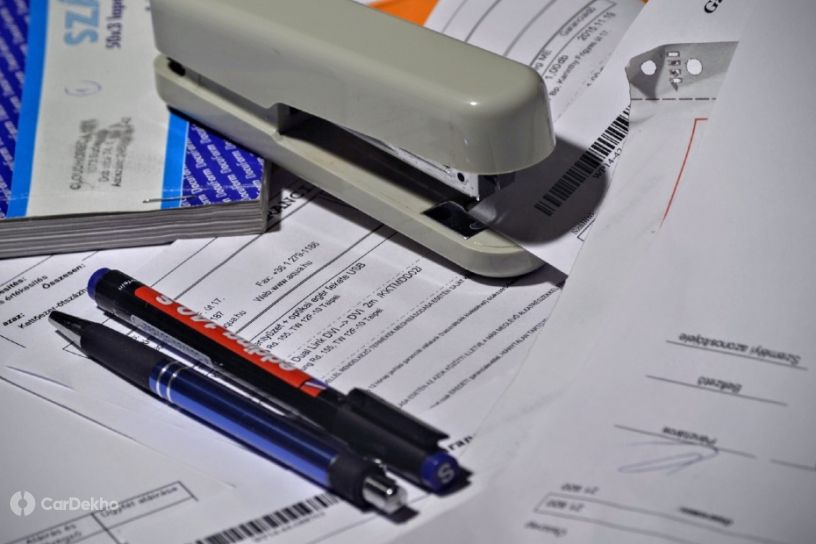Which Documents Do You Need To Sell Your Car?
Modified On Dec 15, 2020 09:57 AM By CarDekho
- Write a comment
Looking to sell your car but don’t have a clue where to start? Well, start by getting your papers in order…

Selling a car can be a daunting task. You need to prep a whole bunch of paperwork including your own personal documents, those of the car, and the various RTO forms. If the documents are ready beforehand, the process of transferring a car’s ownership becomes somewhat smoother though it still involves a fair amount of running around. You can choose to go through this hassle on your own or opt for an easier route that’s mentioned at the end of the article. It’s a good idea to know, though, what the DIY approach would involve. Here is a step-by-step guide to selling your car on your own and what all documents you need to arrange:
1. Registration Certificate (RC): This is the most obvious one. The registration certificate or the RC is the single most important document associated with a vehicle, making it integral to the transfer process. Your RC has all the important information of your car printed on it, so make sure all of the information on it is readable, and that the RC is in good shape. You will also need to make sure that your RC includes any modifications to your car. For instance, if you have had an aftermarket CNG kit installed on your car, or for that matter, had your car repainted in a different colour, then these things need to be updated on your RC. If you have lost your RC, you can get a duplicate issued by filing a FIR with your local police station and then filling up and submitting the Form 26 (downloadable from the Vahan website - www.vahan.nic.in) at the RTO where your vehicle is registered
2. Insurance: No car in India can be transferred from one person to another without a valid insurance. So make sure that your insurance is up to date and valid at the time of sale. There are two ways of getting it done, if your insurance has expired. You can get a comprehensive insurance, which may help you get a better resale value for your car; or you can opt for the cheaper third-party insurance, which won’t bolster the car’s resale value, but will be enough to get the paperwork pushed through the RTO.
3. PUC Certificate: The PUC or Pollution-under-check certificate is another important piece of paper you should have ready before you head to the RTO to get your car transferred. It can be easily obtained by having the pollution levels of your car checked at most fuel stations in India. It costs a nominal amount, anywhere between Rs 50 and Rs 100, to obtain this certificate and is valid for 3 months to a year, depending upon when your vehicle was registered.
Note: The above listed documents are not only required for transferring your car, but also mandatory for driving on public roads. Driving on public roads without their updated copies could lead you to being fined by the traffic police.
4. Self-attested PAN Card: The RTO requires you to furnish your original PAN card at the RTO for inspection and a self-attested copy of the same. If you do not have a PAN card, then you can fill a Form 60 instead, a copy of which can be obtained from your nearest RTO or downloaded from their website.
5. Self-attested Address Proof: Most states in India require the buyer to furnish an address proof at the time of sale. The original is required at the RTO for inspection while a self-attested copy of the same needs to be attached with your paperwork. There are multiple documents which can serve this purpose:
-
Aadhar Card
-
Passport
-
Ration Card
-
Voter ID Card
-
Any other document issued by the Government of India
Some states also accept documents like an electricity bill or rent agreement as an address proof. You will have to check with your local RTO if these documents are accepted as such in your state. Apart from that, some state governments do not require an address proof from the buyer before selling a car. For example, Mumbai RTOs do not require you to furnish an address proof if you are the one selling the car.

6. Self-attested photographs: The paperwork at the RTO requires two passport sized photographs of the seller. These are pasted on the various forms that you will need to submit to transfer the ownership of the car. Once these photographs have been pasted on the required forms, you will also be required to sign across them in a manner that half your signature is on the photograph, and the other half on form underneath. This is how photographs are self attested.
7. Form 28: For you to sell your car, the RTO has to give the all clear about any pending liabilities on your car. This could be based on any loan you took to purchase the car or any outstanding traffic challan. For this purpose, you have to fill out three copies of Form 28 and submit them along with your other paperwork, to the RTO. Form 28 contains the pencil imprint of your car’s chassis number and requires the car to be present in the RTO premises for this purpose.
8. Form 29: After you have completed all the above paperwork, you are required to notify the RTO that you have sold your car to a third party. This is where Form 29 comes into play, and you need to fill up two copies of this form. Along with the copies of Form 29, you are also required to pay a nominal fee (varies on each sale and between RTOs) to complete the sale process for your car. You’d think this is the final step, but it is not. There’s still one more form to fill and submit.
9. Form 30: You need to fill up two copies of Form 30 and submit them to the RTO. Form 30 is a request that you as a seller lodge with the RTO, to transfer the vehicle in the name of the buyer. Form 30 indicated that all liabilities, majorly financial, have been transferred to the buyer. This process needs to be undertaken within 14 days of selling the car. You also have to pay a nominal fee (varies on each sale and between RTOs) to get your Form 30 processed.
10. Sales Affidavit: The sales affidavit is made in the seller’s name, indicating the price at which the car has been purchased by the buyer. It also indicates that all legal liabilities related to the vehicle have now been transferred to the buyer. This document is notarised by a public notary, once the RC has been transferred.

Like we said before, you can take the hard route of doing the above mentioned steps on your own to sell your car or avoid them altogether by visiting used car specialists such as CarDekho Gaadi store. The benefits? They will carry out the entire paperwork including RC transfer absolutely free of cost. You can also be assured of receiving the best price for your car and if you are satisfied with the offer, the money is transferred to your account instantly! With all of the convenience this approach comes with, it’s certainly worth giving a try, isn’t it?
3 out of 3 found this helpful















